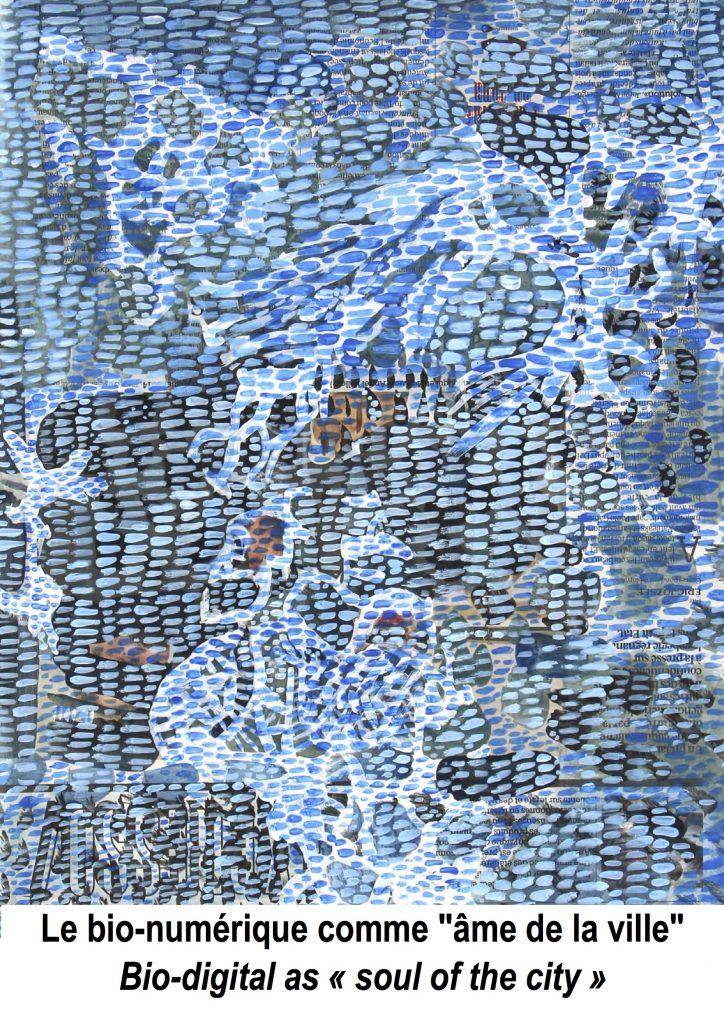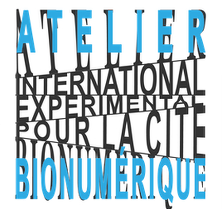 Towards the complex projétation the international Bio-Digital thought movement is developing on a Franco-Korean axis. It brings together academics and creatives. These specialists reconcile new methods of scientific analysis and new approaches to creation and development. They want to meet the new demands of the people and meet the new planetary constraints. This movement of thought is interested in the new methods of Constitution/re-constitution of the real proposed by the digital and the biological. How can the parameterization, the algorithm, the Écosystémie, the self-organization, fertilize and enrich the project approaches in the fields of architecture, urbanism, landscape, agriculture, governance, art, Sustainable development? That is the central question. The new approaches of projétation are to be examined. Within this movement of thought, “bio-digital Architects” study how science and avant-garde techniques (Science of complexity, numerical) influence the ways of working, living, producing, collaborating, To Mutualize, to invent, to build, to organize and to re-organize our living environment. The workshop «2017 Paris-Seoul bio-Digital City»: Architecture and digital soul of the city
Towards the complex projétation the international Bio-Digital thought movement is developing on a Franco-Korean axis. It brings together academics and creatives. These specialists reconcile new methods of scientific analysis and new approaches to creation and development. They want to meet the new demands of the people and meet the new planetary constraints. This movement of thought is interested in the new methods of Constitution/re-constitution of the real proposed by the digital and the biological. How can the parameterization, the algorithm, the Écosystémie, the self-organization, fertilize and enrich the project approaches in the fields of architecture, urbanism, landscape, agriculture, governance, art, Sustainable development? That is the central question. The new approaches of projétation are to be examined. Within this movement of thought, “bio-digital Architects” study how science and avant-garde techniques (Science of complexity, numerical) influence the ways of working, living, producing, collaborating, To Mutualize, to invent, to build, to organize and to re-organize our living environment. The workshop «2017 Paris-Seoul bio-Digital City»: Architecture and digital soul of the city
The workshop will be held from August 27 to September 04, 2017 at the Seoul Science Center.
On this occasion, we will seek how the “digital Soul of the city” can enrich our architectural, artistic, philosophical, social cultures. Social networks, transport monitoring data, urban memories stored and shared on the internet, are digital expressions of the soul of the city. The latter is part of a materiality and is therefore both real and virtual, instantaneous, capable of recording history and predicting evolutions. The big data, the digital methods, the new ways of communicating create new cultures, new ways to organize society, work, leisure. This new “urban, architectural, biological and human soul” is filtered by algorithms. It enlarges the soul experienced by each individual and the “collective soul” of all users. The city must be a place that gathers and hybrids these cultures and advanced techniques to put them at the service of its users. The Bio-digital movement seeks in the soul of the city harmonious reconciliations between man and his city, between man and nature but also between men. The experimental laboratory of the City of Sciences and Industry (Paris), partner of the workshop This laboratory brings together the ADIK (Seoul and Daegu) and the International Experimental Workshop for the Cité Bio-numérique (Paris). He is experimenting with the new methods of organisation applied to the construction of the land. Workshops are regularly organized in Paris and Seoul. The workshops are led by Seungnam Baek, Claire Bailly and Jean Magerand, architects, researchers and teachers in architectural schools. Since 2012, this experimental laboratory has brought together international teams of young researchers from all academic, inventive and technical fields: architects, ecologists, sociologists, biologists, agronomists, mathematicians, Philosophers, landscapers, roboticists, it theorists, urban planners, economists, health specialists, etc. The laboratory’s projects are bio-numerical, i.e. they are first ecological and sustainable. Then they use the digital, the big data, the optimization by the computer and in a general way the most advanced technologies. Territorial algorithms, spatial modeling, parameterized optimization, complex structurellles data, methodical écosystémie, self-organized co-working, collaborative solidarity, complex mutualisation, Organizational bio-mimicry, the agronomic self-organization, are experienced in these “bio-digital” projects. To achieve its purpose, the laboratory identifies new methods, new materials, new techniques, new know-how, new arts to live. It assembles them in complex development projects. Young researchers use, value and cross, the most advanced technical, scientific, industrial and sociological knowledge in urban, architectural or agricultural projects. The objective is to design, experiment, build and manage, cities, buildings, agriculture, by optimizing and innovative methods. The researchers produce, through digital, self-organized and intelligent urban prototypes, models of hyper-recyclers cities, algorithmic architectures, bio-optimized agriculture, economic micro-systems, Shared and self-supporting social contracts, urban and robotic agriculture, high-rise optimised buildings, multi-use housing cells, bio-boosted biodiversity spaces, self-sufficient vertical farms and Self-recyclers, permacoles macro-farms, joint and several associative organizations. The exhibition of bio-digital art works, another way of reflecting on the digital soul of the city in parallel to its work on urbanism, architecture and landscape, the experimental laboratory has formed “artistic teams” that produce Complex “bio-digital” works. The latter re-interpret, in the field of art, the methods and inventive steps tested in the territorial domains. The artistic teams bring together an architect, an artist and digital specialists (computer scientists, mathematicians, roboticists). They produce bio-digital works of art, all made from the same specifications. All these steps and projects were presented to the City of science and industry throughout their development. The public was able to interact with researchers and designers. Bio-Digital works will be exhibited during the workshop at Seoul City Hall. Towards new skills of the architect Bio-digital architects are studying how architecture should integrate, in this context, new ways of organizing the city and the habitat. They are experimenting with new methods to develop this “digital soul of the city“. The architects are able to feel, to understand this soul of the city. They can use digital tools in a specific way to better analyze and re-invent what can become the “augmented soul of the city“. The workshop and the exhibition will highlight the strength of the architects ‘ proposal in society; They are able to use the most efficient tools, methods and techniques. With these, they know how to build and develop even better and make more enjoyable living environments. The Movement for bio-digital architecture launches a new debate on the occasion of the September workshop in Seoul, conferences will bring together French or Korean bio-digital architects. Their presentations will help to understand how to better grasp digital to install new frameworks of life. During the Congress, we hope that the young participants in the workshop can discuss their work with the public and with the architects-Congressmen in order to gather opinions and criticisms, in order to publicize their new methods and In order to exchange. It is a question of creating a place of debate, between architects, on the subject of foresight and the future of the architects ‘ know-how. At the international level beyond the September UIA Congress, the “bio-digital Architects” movement wants to provoke a debate on the new modernization of our professional know-how. The production of architects must today accompany this mutation of creation that carries digital and data mining. As at the beginning of the 20th century, architects must be the spearhead of social and societal experimentation. Bio-Digital Architects want to gather all the creative energies to show that avant-garde techniques are not necessarily alienating and inhuman methods; They can be used to invent cities and architectures that are more enjoyable to live and more respectful of the natural environment. We invite architects from all countries to join our Franco-Korean reflections in order to engage in a great international debate on all these topics. The Partners Laboratoire EVCAU (ENSAPVS), University of Mons (Belgium), him, Korean Institute of Architects, Institut Jacques Monod, Université Paris Diderot, the French Institute in Seoul, Architectural Design Institute of Korea, Embassy of France in Korea, Seoul Citizen Hall, Seoul City Hall, Seoul Science Center, Yeungnam University (Daegu), Chungang University (Seoul) Web sites




